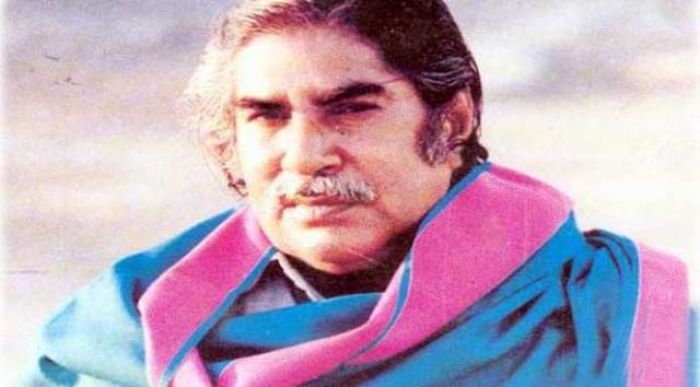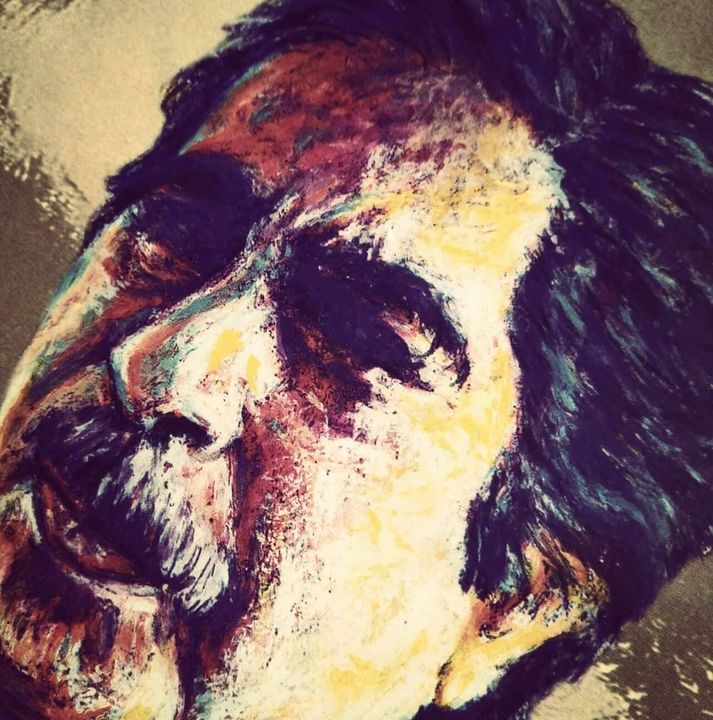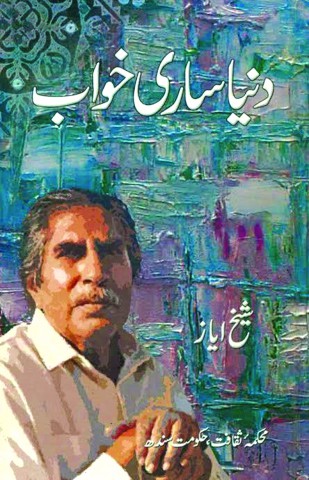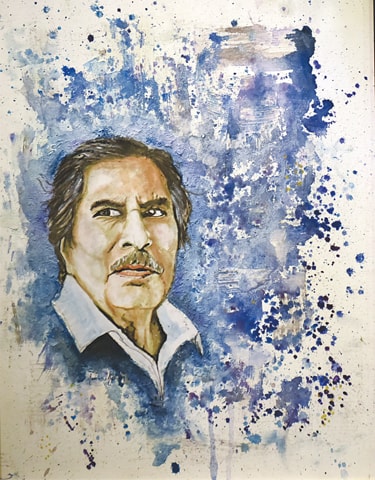
Raza Naeem, a writer from Punjab describes Shaikh Ayaz as a revolutionary poet whose head was crowned with penalties.
Land of Sindh, upon you I bow my forehead
The poetry of Shaikh Ayaz played a wholesome role in the nationalist, patriotic and progressive poetry of Sindh. This was the very reason that in the 7th decade of the last century, the slogan of “Sindh ki aavaaz…Shaikh Ayaz Shaikh Ayaz” (The Voice of Sindh…Shaikh Ayaz Shaikh Ayaz) became common. Actually in the decade of the 1970s, the flag of nationalist and progressive politics was in the hand of writers and poets.
The political character of the poetry of Shaikh Ayaz can be gauged from the fact that from those days till now, the following poem of Shaikh Ayaz has been made the anthem of the Jiye Sindh Movement:
“Sindh des ki dharti tum par apna sar main jhukaaun
Mitti maathe laaun”
(Land of Sindh, upon you I bow my forehead
I bring your earth to my forehead)
Zulfikar Ali Bhutto appointed Shaikh Ayaz as the Vice Chancellor of Sindh University during his government and he remained in this position even after the seizure of power by General Zia-ul-Haq. Nationalist circles expressed intense dislike at this appointment and writings against him came to light.
 Shaikh Ayaz writes in his autobiography, “Had the Jiye Sindh lads not bothered me and not participated in that conspiracy under their watch, they could have made the university better.” He found out about their requirements by visiting every class and fulfilled them; international journals were brought at the recommendation of every Dean. So many writers were given employment – which had never been given before during the entire period of the university.
Shaikh Ayaz writes in his autobiography, “Had the Jiye Sindh lads not bothered me and not participated in that conspiracy under their watch, they could have made the university better.” He found out about their requirements by visiting every class and fulfilled them; international journals were brought at the recommendation of every Dean. So many writers were given employment – which had never been given before during the entire period of the university.
He has also narrated an interesting incident of Sindh University. He writes that one night at 1 am, a crowd of youth gathered outside the V.C. House and began to shout “Jiye Sindh Jiye Sindh.”
“The guard told me that the boys are trying to enter inside through the gate: ‘If you permit it, can we fire 2 or 3 times?’ I disallowed him and loaded my revolver, hiding it beneath the chador, and went towards the gate. The boys said to me, ‘Have you come to sleep here?’ I responded, ‘One can sleep even on the scaffold: why have you come now?’
The boys said that a former soldier came to G. M. Syed and made the excuse that he has become influenced by Syed’s ideas. We suspected him so we caught him, a dagger was found on him. I asked ‘Then what did you do?’ They told me that they bound him and beat him up so he said, ‘I have been sent by Shaikh Ayaz to kill G. M. Syed.’”
The Sindhi operas of Shaikh Ayaz
Apart from poetry, Shaikh Ayaz wrote operas in the Sindhi language for the first time which include Dodo Soomro ki Maut (The Death of Dodo Soomro), Ranikot ke Daku (The Dacoits of Ranikot) and Bhagat Singh. Naz Sahito has staged these operas. They have been written keeping in mind resistance, patriotism and political consciousness but unfortunately in the last 40 years, had not been staged. Only in 1980 was a drama staged in Hyderabad, afterwards all the 3 operas were presented.
In ‘The Dacoits of Ranikot’, there is a village named Sindh near Ranikot. Dacoits forcibly enter it, which is resisted by the local people, this illustrates the period of Martial Law and the resistance of Sindh, in which symbols had been utilized.
Apart from poetry, Shaikh Ayaz wrote operas in the Sindhi language for the first time
Shaikh Ayaz and Urdu literature
Shaikh Ayaz writes in his autobiography that after the creation of Pakistan he was appointed as the Vice President of the Progressive Writers Association; he was the only Sindhi and the reason for the appointment at this position was that he could write a lot better than those writers whose language was Urdu.
Very few people know about Shaikh Ayaz that he began his poetry with Urdu. His very first poetic collection Boo-e-Gul Naala-e-Dil (Fragrant Flower Crying Heart) was in Urdu. When he was a Matriculation student, he knew the whole of Divan-e-Ghalib by heart. He also had a grasp upon Farsi.
 He never maintained prejudice of language in poetry, and not only translated the poetry of Shah Abdul Latif Bhittai Shah Jo Risalo into Urdu, but also translated many verses of Sachal Sarmast and ‘Sami’, the Hindu Sufi poet of Sindh.
He never maintained prejudice of language in poetry, and not only translated the poetry of Shah Abdul Latif Bhittai Shah Jo Risalo into Urdu, but also translated many verses of Sachal Sarmast and ‘Sami’, the Hindu Sufi poet of Sindh.
It is really sad that the custodians of the ‘national literature’ of Pakistan never gave Shaikh Ayaz any importance in his lifetime but despite this, he kept writing in Urdu. His last Urdu collection is titled Neel Kanth aur Neem ke Patte (Blue Jay and Neem Leaves).
Inclination towards religion
The last days of Shaikh Ayaz – a supporter of socialism, understood to be a symbol of political resistance – were inclined towards religion. Like Faiz Ahmad Faiz and Jalib, he too wrote prayers. In his collection Sanjhi Samand Sapoon (Dusk, Sea and Shells) which was published a year before his death, he writes, “I thought a lot upon Man, the universe, human values and fate in the hospital room and after disappointment with socialism my inclination towards religion was compulsory, but despite being engrossed in the idea of God, I do not have hatred of anybody.”
According to Shaikh Ayaz, “It is apparent from the book of prayers that I have kept the whole human self in mind while writing prayer. My songs do not have association with any type of right-wing nor have I joined in any type of such party and have no intention of doing so. Actually I have renounced politics for good and understand that the political association of poetry proves to be suicide.”
Imprint over younger generations
Shaikh Ayaz gave diction, images, style, themes, manner of writing and mental scenography to Sindhi language and poetry. He is a source of encouragement for the youth of Sindh even today.
 The new writers of Sindh appear to be more influenced by Shaikh Ayaz than Shah Latif. In fact, Ayaz had an idea of this, therefore he had written that “Whatever poetry will be written in Sindh after me will be like when the sugarcane crop is cut, another crop emerges from its root.”
The new writers of Sindh appear to be more influenced by Shaikh Ayaz than Shah Latif. In fact, Ayaz had an idea of this, therefore he had written that “Whatever poetry will be written in Sindh after me will be like when the sugarcane crop is cut, another crop emerges from its root.”
I would like to end with some beautiful verses from Shaikh Ayaz mentioned on the back cover of Alvi’s translated volume which exemplifies the defiance of Ayaz the poet:
“Baghi hoon main baghi tera ae maghroor samaj!
Khoon ke akhri qatre tak main laroonga tere saath
Jis ka raasta takte takte beeti raat Ayaz
Ayega voh ayega kab ishq ne khai maat”
(O arrogant society, I am your rebel
Till the last drop of blood will I fight with you my duel
Waiting for whom the night passed Ayaz
He will come, victorious love will make him compel)
(Concludes)
____________________
Raza Naeem is a social scientist, book critic and award-winning translator and drama reader, currently based in Lahore, where he is also the president of the Progressive Writers Association.
Courtesy: The Friday Times Lahore
Click here for Part-I, Part-II